SINGAPORE: The Ministry of Manpower (MOM) said it has not observed a spike in the number of migrant worker suicides compared to previous years, although it is aware of recent incidents involving workers living in dormitories.
“The Ministry of Manpower is aware of the recent spate of suicides and attempted suicides involving migrant workers living at the dormitories,” said MOM late on Wednesday (Aug 5) in response to CNA’s queries.
“While we have not observed a spike in the number of migrant worker suicides compared to previous years, we are monitoring the situation and are working closely with our partners and NGOs to enhance our mental health support programmes for the workers.”
More than 300,000 migrant workers living in dormitories had been placed in lockdown in April as part of the Government’s strategy to curb the spread of COVID-19.
READ: Vast majority of foreign workers to be cleared of COVID-19 by early August: Lawrence Wong
In recent weeks, there have been questions about the state of workers’ mental health following reports of unnatural deaths.
On Jul 24, a 37-year-old Indian worker was found dead at 512 Old Choa Chu Kang Road. According to the police, this is a case of an “unnatural death” and investigations are ongoing.
In May, a 27-year-old migrant worker from Bangladesh was found motionless at a factory converted dormitory in Kranji.
A few weeks before that, a 46-year-old Indian national died from his injuries after being found motionless at a staircase landing at Khoo Teck Puat Hospital.
Videos have also circulated online, with some showing workers standing precariously on rooftops and high ledges.
One of these videos, posted sometime around Jul 22, shows a worker standing on a ledge at PPT Lodge 1B dormitory in Seletar.
The worker, who was staying in a block that was cleared of COVID-19, had bought a flight ticket home on his own and became agitated when his employer “was not facilitative of his return”, MOM had said in a Facebook post.
A dispute occurred as the worker did not discuss with his employer his intention to return home, MOM had said. He was allowed to leave Singapore the next day.
A screenshot of a video that circulated online showing a man standing on top of a dormitory railing. MOM said a dispute had occured between the worker and his employer.
On Aug 2, another worker had appeared to harm himself at his dormitory in Sungei Kadut. Photos circulating online show a man lying bloodied on a stairwell.
MOM told CNA in an earlier statement that said the man is in stable condition.
“Checks by MOM found that the worker had no salary arrears, and his food and accommodation were provided for. There was also no indication that he was in distress prior to the incident,” the ministry said.
READ: Foreign worker dormitory linked to more than 1,500 COVID-19 cases among 9 more clusters closed
Given the recent incidents, MOM said its Forward Assurance and Support Teams – public officers stationed at the dormitories – have stepped up efforts to “proactively look out for residents whom they assess may benefit from speaking to a mental health counsellor”.
“We have also worked with IMH to train and better equip frontline staff with the knowledge and skills to help workers who may require support,” it added.
MENTAL HEALTH HIT BY CONFINEMENT, UNCERTAINTY OVER JOBS: HELP GROUPS
Uncertainties over their health, jobs and prolonged confinement have affected the mental state of many migrant workers during the COVID-19 pandemic, migrant worker advocacy groups said.
According to Mr Justin Paul, non-profit organisation HealthServe’s mental health programme manager, there have been more cases of workers trying to harm themselves or who have expressed a desire to do so because of the stressful situation.
His organisation has seen an increase in the number of workers tapping their mental health services.
In April, 71 workers reached out to them through their virtual advisory sessions, counselling services and online group therapy sessions. It saw 244 workers in June and 207 in July. In total, HealthServe received queries from about 750 workers so far.
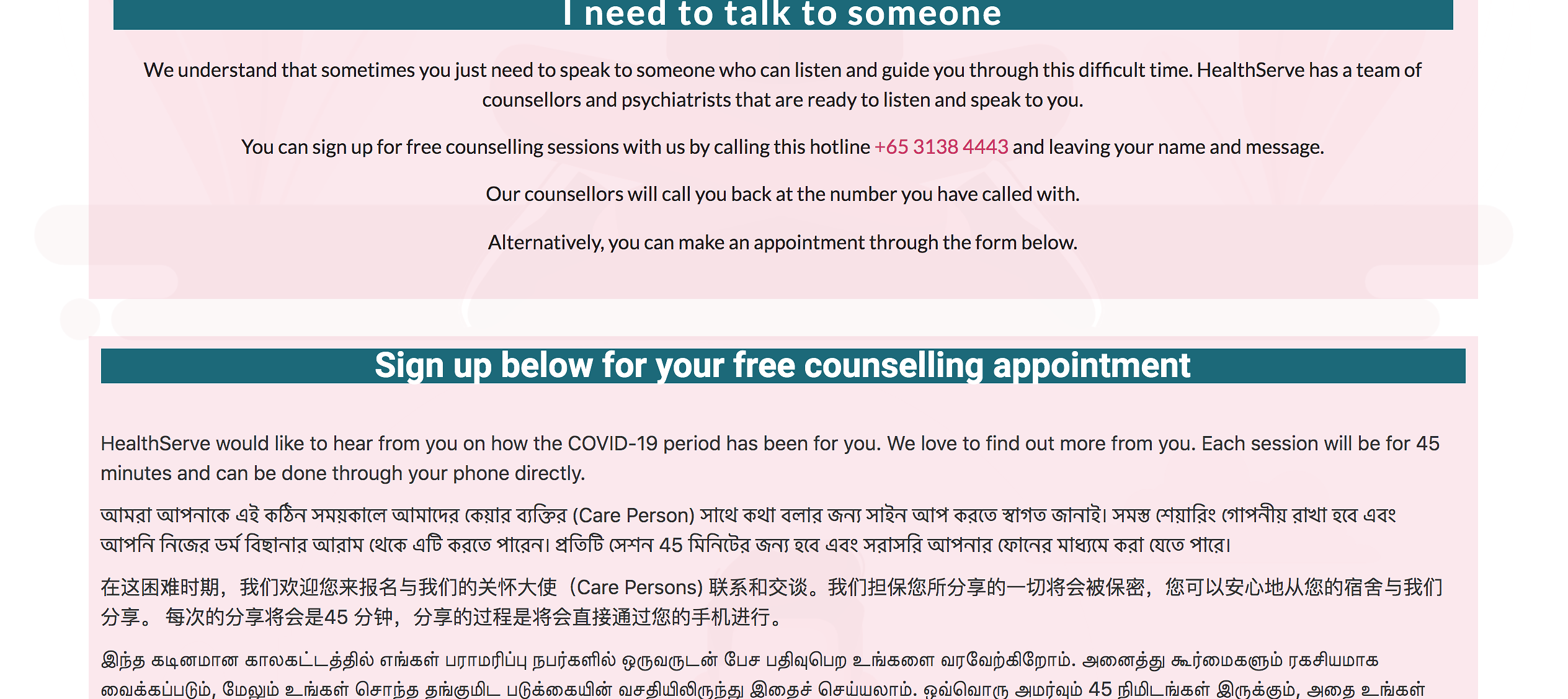
Screenshot of a webpage on HealthServe’s website asking workers who need to seek advice to sign up for their tele-advisory service.
“Broadly-speaking they are stressed by various uncertainties,” said Dr Chan Lai Gwen, a psychiatrist based at Tan Tock Seng Hospital who volunteers with HealthServe.
Listing their concerns, Dr Chan said: “Whether they will eventually contract COVID-19, whether they may get reinfected after recovery and returning to the dormitory, how long more their quarantine (or) isolation will last, whether they will be able to return home and see their families, whether they will be physically fit to go back to work, whether they still have a job to return to (and) whether their work permits will be renewed.”
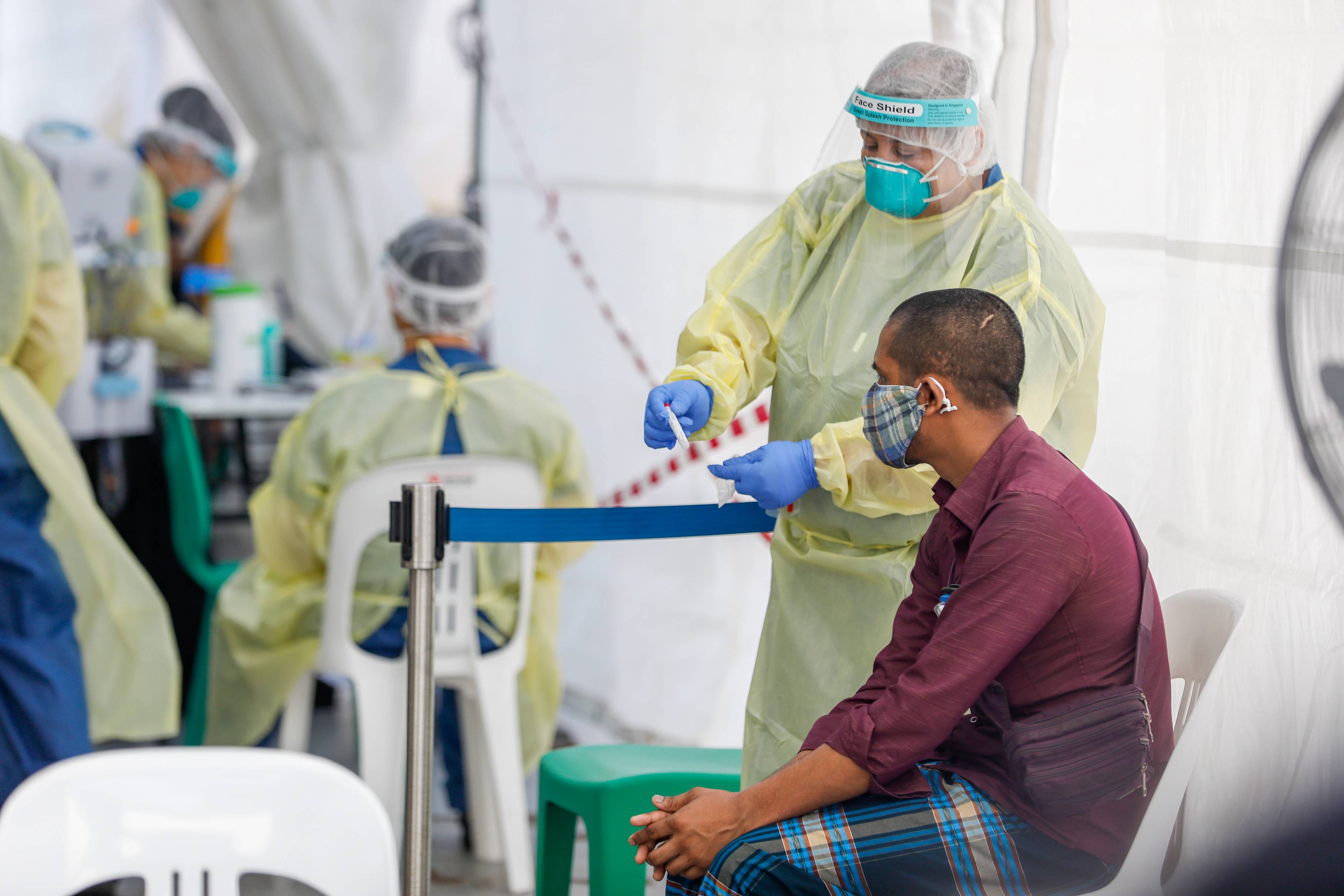
Onsite medical facilities for workers at foreign worker dormitory Avery Lodge. (Photo: Singapore Ministry of Manpower)
The situation reached a breaking point right after the “circuit breaker” ended, said Mr Paul. Workers who had been cooped up for two months thought they would finally be able to return to their jobs, but that did not happen.
“When Jun 2 came and went, a lot of the workers who were holding back and had accumulated stress from April started to break in different ways,” he said, adding that HealthServe’s counselling team started to see an increase in workers expressing self-harm and suicidal thoughts.
For Chinese national workers, the stress was compounded by news of people in China returning to work. Family members back home began to pressure them for money, he added.
The Community Isolation Facility for COVID-19 patients at the Singapore Expo and Max Atria. (Photo: Ministry of Health)
In cases of attempted suicides, MOM said that based on its records and engagements with the NGOs, such incidents stem from problems workers face back home, such as marital or familial issues, or unforeseen mishaps in their home countries.
“Due to the current COVID-19 situation, migrant workers may face delays in returning home, thereby causing distress as they are unable to be with their families,” said MOM on Wednesday.
“MOM has been facilitating workers’ return to their home countries. But as there are various factors involved, such as ensuring that these workers have recovered and have taken a swab test as required by some home countries, we seek employers’ and workers’ understanding that it may take some time for workers to be able to return home.”
Rights groups CNA spoke to said another factor affecting migrant workers during this period is their living environment.
Conflicts are inevitable when several workers of different cultural and religious backgrounds stay in a room 24/7, said Mr Samuel Gift Stephen, founder of the Alliance of Guest Workers Outreach.
“Imagine if one guy is praying and another is playing music in the background … You know how important their religion is. If they can’t practise it properly, it’s definitely going to affect their mental state,” said Mr Stephen, whose organisation reaches out to South Asian workers living in dormitories.
Then there are recovered workers staying in hotels and cruise ships. With strict measures limiting movement and rooms without windows, many workers felt disoriented, said Mr Cai Yinzhou, co-founder of the COVID-19 Migrant Support Coalition.
READ: Inside the SuperStar Gemini cruise ship for foreign workers who’ve recovered from COVID-19
WATCH: Life in isolation – when a migrant worker gets COVID-19 in Singapore
The same goes for workers at community care facilities, added Mr Paul, who cited an example of once seeing a large group of men at the Singapore Expo crowding around a tiny hole where sunlight was seeping through near a makeshift toilet.
“One worker asked if it was Thursday when it was a Saturday,” said Mr Cai who had visited the workers. “Some of them can’t sleep. Or when they do, (they) have nightmares.”
Comments on social media platforms claiming that the workers are having a good time in the hotels and cruise ships have been particularly demeaning, said Mr Cai.
A worker jogging around his seat during his recreational time. (Photo: Gaya Chandramohan)
Lately, more workers have expressed a desire to return home to recuperate, said Dr Chan, who has also seen cases of workers who have thoughts of harming themselves.
“Everyone involved with migrant workers needs to be aware of the stress they are facing and the real risk of suicide and self-harm when the sense of desperation escalates,” Dr Chan said. “Suicide is preventable.”
HELP AVAILABLE
Mental health resources are available to workers, MOM said on Wednesday.
“We have made considerable effort to keep workers up to date on COVID-related efforts, through daily messages and also materials in their languages to promote the mental health and well-being of workers. These materials encourage workers to identify symptoms of distress, look out for one another, be a buddy to a friend, and know where to seek help,” said the ministry.
It added that to reduce the effect of isolation, time has been scheduled for workers to leave their rooms and access common areas. The ministry said it has also worked with NGOs to run activities such as exercise sessions.
“Moving forward, when community and dormitory cases have been sustained at low levels for a period of time, we are planning for migrant workers to be able to leave their dormitories for the Recreational Centres in a measured and safe manner,” said MOM.
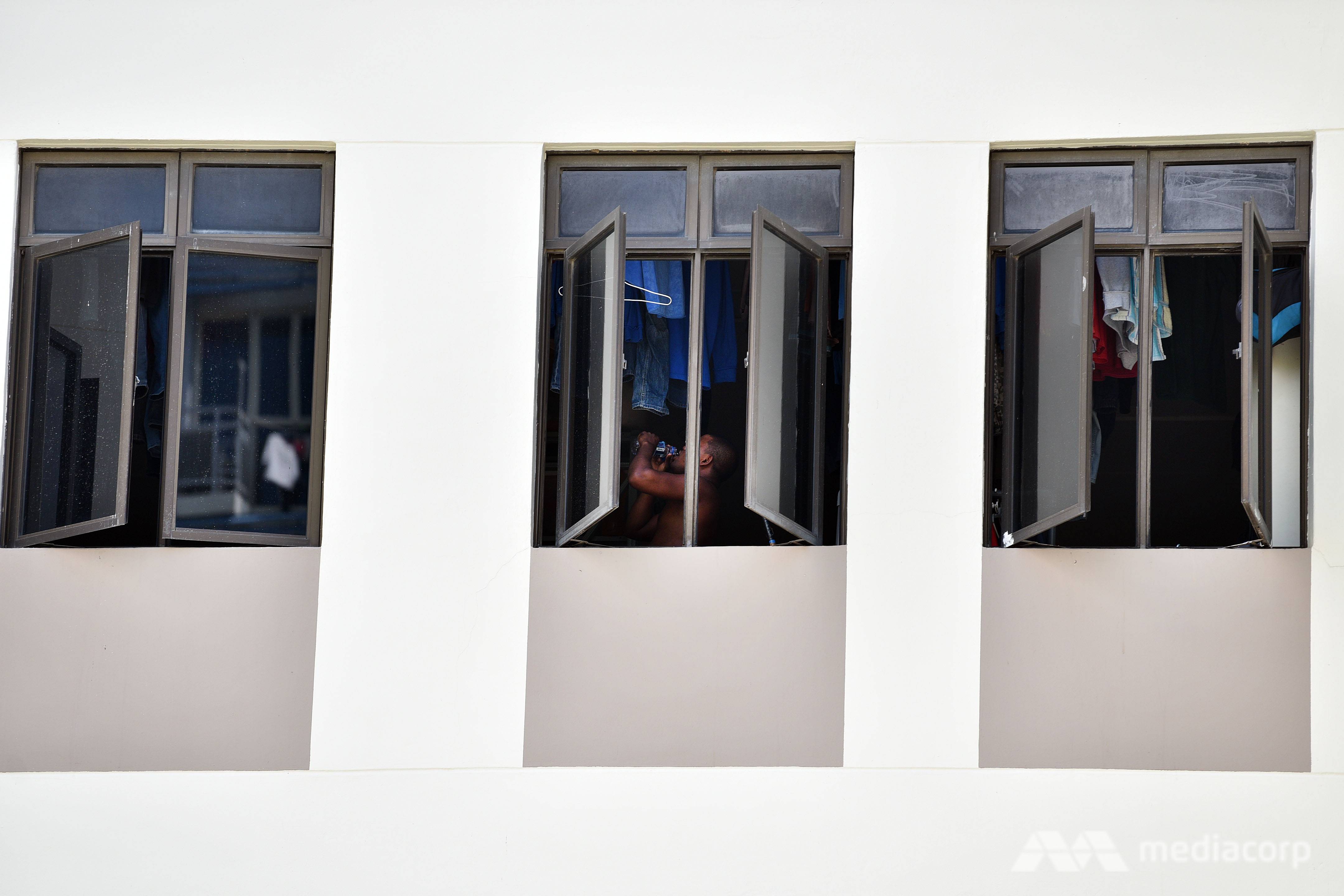
A resident is seen drinking water from a bottle at Tampines Dormitory on Apr 20, 2020. (Photo: Jeremy Long)
The NGOs have been also trying to help the workers in other ways.
For instance, Mr Cai’s group has been delivering goods like coffee, tea and shavers to the workers since the circuit breaker. More than a million of these items have been given out, he said.
The volunteers have also been running engagement programmes to befriend workers and cut their hair.
“Some of their hair are so long, and it’s so uncomfortable for them,” he said. “Just snipping it off gives them quite a bit of respite.”
READ: Can Singapore rely less on foreign workers? It’s not just about dollars and cents, say observers
Recently, a virtual town hall was held for about 60 workers where a doctor and some migrant workers explained the current situation and policies and took questions.
Mr Stephen’s group is working with 300 factory-converted dormitories to deliver meals and befriend the workers who pick up the food.
His organisation is also in the midst of setting up an e-counselling service that matches workers with professional counsellors from their home country.
SOME EMPLOYERS DO THEIR PART
Employers have also been trying to do their part.
Ms Calsia Lee, director of interior design firm Collective Designs, said she and her colleagues call their workers at least once a week and send them cakes occasionally. There is a WhatsApp chat group for them to reach out anytime.
The company has reassured them that they will still have a job when they are allowed to leave, Ms Lee added.
“The whole company feels sorry for them, and heartbroken, looking at their living conditions. They haven’t had the autonomy to simply go for a walk, to stretch or pick up a hobby at home, like the rest of us did,” she said.
“We empathise with their fears of contracting COVID-19, the uncertainty of their future, their being away from family.”
Mr Xu Xu Ping, managing director of Chian Teck construction firm, echoed the sentiments.
Since the beginning of the dormitory isolation, Mr Xu and other members of the upper management team began planning activities for workers to boost their morale.
Mr Xu’s company sometimes caters comfort food for his workers. (Photo: Xu Xu Ping)
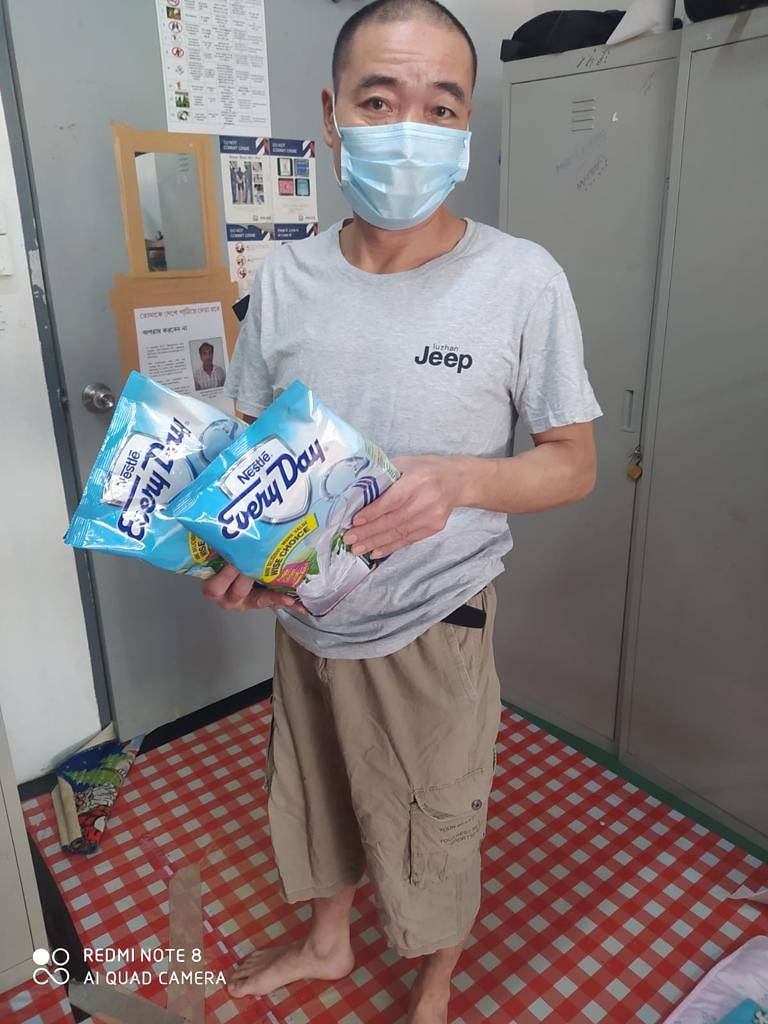
Mr Xu’s workers receive small gifts like milk powder from the company occasionally. (Photo: Xu Xu Ping).
“We treat ourselves like we are the workers inside,” said Mr Xu. “All these little efforts we try to do is to show them that we care.”
Such activities include weekly games with small prizes to be won, sending Chinese herbs to “boost their immune systems” and even getting their company engineers to double up as English teachers over virtual classes.
Sometimes he sends his workers encouraging video messages and notes.
“We really need the morale from the workers,” Mr Xu said.
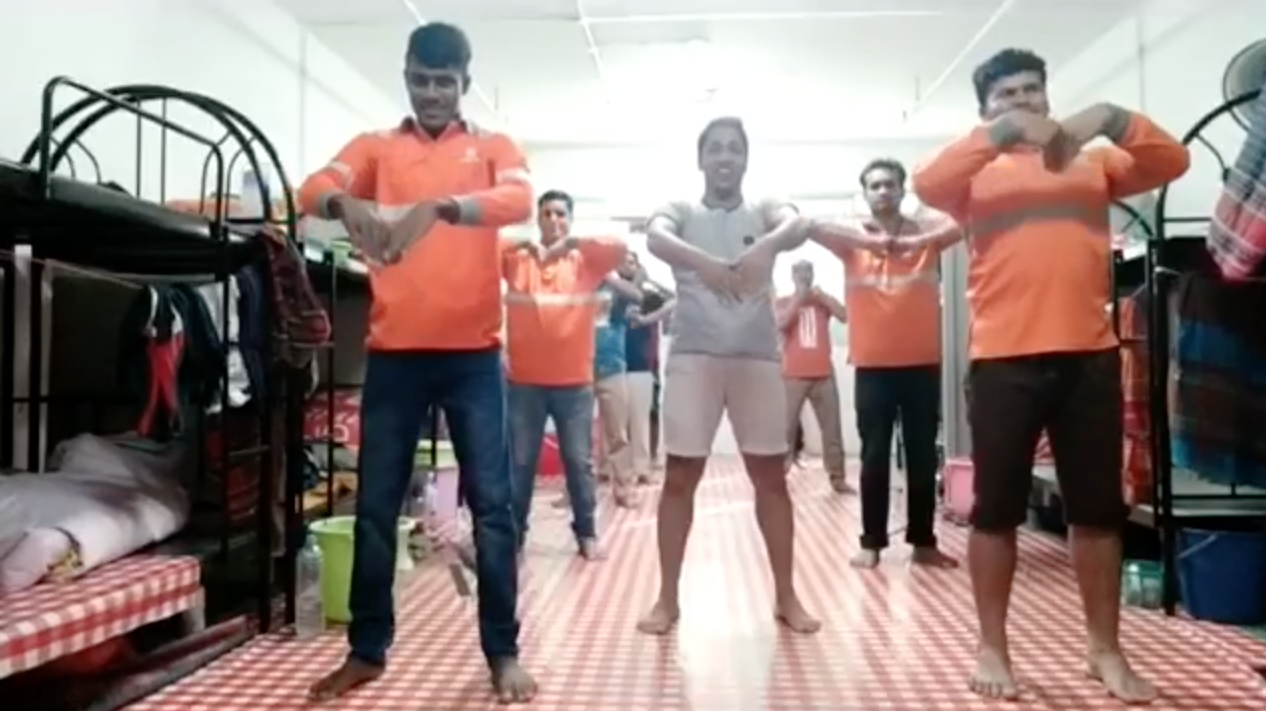
A worker leads his colleagues through some exercises while inside the dormitory. They filmed it to show Mr Xu.
Short-term anxieties aside, Mr Xu and his team is trying to focus on the possible long-term effects of the workers’ strained mental health.
“Some of them (workers) are calling us to say, ‘please let me go back, I don’t want to stay here anymore’
“If let’s say there’s a chance for the workers to go home, we expect 30 per cent to just leave without second thoughts,” he said.
“I think this this period of lockdown is like a wound for the workers,” he added. “It’s not going to heal so fast and if the workers (are) not with Singapore then we are going to have a massive shortage of skilled workers when we restart construction.”
One worker who is planning to head home to China is Mr Siang Chonglin (not his real name).
A sole breadwinner, the 51-year-old construction worker has not been able to go back to work. For almost three months, he has been at Seletar East Camp, which is among the temporary accommodations arranged for migrant workers who are well.
When CNA spoke to Mr Siang on Jul 25, the Chinese national’s hopes of returning to his dormitory had been dashed because some workers in the camp tested positive during a round of swabbing on Jul 20.
“It’ll be a lie to say that I’m not disappointed now,” said Mr Siang, who asked that his name be changed in this report given fears that it would affect his plans to return to China.
“HAVE TO PLAY OUR PART TO CURB THE VIRUS”
Four months since the lockdown was imposed, nearly 90 per cent of these workers have either recovered or been tested to be free from COVID-19. Even then, they are allowed to leave the dormitories only for work and must return immediately after that.
Although workers struggled through the lockdown, there are many who understand the need for such measures.
“I understand the lockdown. We cannot leave because otherwise we are a security risk to the rest of Singapore,” said Hasan Najmul who has mostly been confined in his room at a Choa Chu Kang dormitory since April.
The only time he felt down was during his quarantine in July, said the 24-year-old Bangladeshi. He was afraid he had contracted COVID-19.
“My bosses called me, tell me ‘don’t worry’,” said Mr Hasan, who has been in Singapore for six years. “They are very good. Send food, give us our pay.”
Hasan Najmul, a 24-year-old Bangladeshi, said that he understands the need to keep workers like him isolated in order to stop the virus from spreading. (Photo: Hasan Najmal)
Mr Paul said while he has seen workers in distress, others have told him they feel well-supported by employers. Some have written to the authorities to express their gratitude over the care they received.
“The Government is doing the best to give us what we need. They are spending money on us,” added Fan Bing, a 48-year-old Chinese national who has been in Singapore for 17 years. “I’m satisfied.”
Mr Bing has been spending his time on movies, social media app Douyin, reading the news and chatting with his bunkmates.
“We are anxious to start work. But I wouldn’t dare to go back to work if the virus was still out there.
“There’s no choice. We just have to play our part to curb the virus … and be open-minded about the situation,” he said. “I’m hoping it’ll end soon too.”
Where to get help: Various migrant worker charities operate hotlines, including HealthServe (+65 3138 4443), Migrant Workers’ Centre (+65 6536 2692), Humanitarian Organization for Migration Economics (6341 5535) and Transient Workers Count Too (6297 7564). Samaritans of Singapore operates a 24-hour hotline at 1800 221 4444, or you can email pat@sos.org.sg. If someone you know is at immediate risk, call 24-hour emergency medical services.
BOOKMARK THIS: Our comprehensive coverage of the coronavirus outbreak and its developments
Download our app or subscribe to our Telegram channel for the latest updates on the coronavirus outbreak: https://cna.asia/telegram




